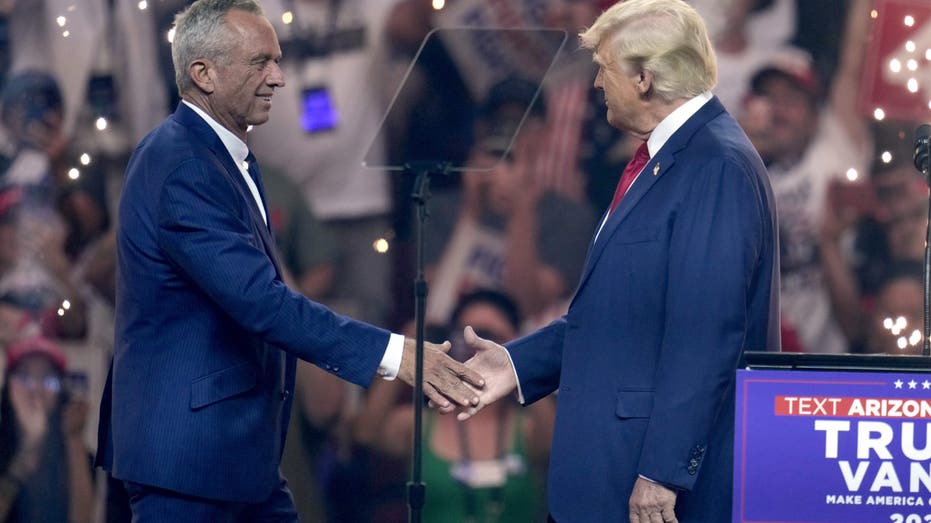Attorney for RFK Jr. blasts 'hysterical' media report as distortion of HHS pick's views on vaccines
An attorney advising Robert F. Kennedy Jr. is slamming a New York Times report last week that claimed the Trump HHS secretary nominee sought to revoke the Food and Drug Administration's (FDA) approval for the polio vaccine.
"Contrary to hysterical media reports that the petition sought to make sure no polio vaccines would be available, the scope of the petition was quite narrow," Aaron Siri, a close RFK Jr. adviser and partner at Siri & Glimstad LLP, told Fox News Digital. "It simply asked the FDA to require a proper trial for licensure for children of a novel polio vaccine."
The New York Times reported Friday that Siri is "waging a war" against all vaccines, but Siri said the report "falsely claimed the petition sought to eliminate" the polio vaccine, "as if there is only one, and that our client sought to leave Americans without the choice to get vaccinated for polio."
RFK JR SET TO FACE ABORTION, VACCINE SCRUTINY IN SIT-DOWNS WITH SENATORS ON CAPITOL HILL
"In reality, the petition sought to ensure the safety of one of the six existing licensed polio vaccines that we inject into our children three times before their first birthday," he said.
The report came just days before RFK Jr. headed to Capitol Hill this week to meet with Senators, seeking support for his HHS confirmation.
The petition, filed in 2022 on behalf of the Informed Consent Action Network (ICAN) and not as an individual action by Siri, urged the FDA to suspend the polio vaccine IPOL for infants and children. ICAN's request stems from concerns that IPOL, licensed in 1990 by Sanofi, was approved based on pediatric trials that, according to the FDA, evaluated safety for only three days after injection.
This is not the traditional polio vaccine developed by Jonas Salk or Albert Sabin that many people are familiar with, Siri added. Instead, it is a product utilizing a different technology, where the polio virus is grown on monkey kidney cells that have been genetically altered to replicate indefinitely, similar to cancer cells. Traces of these cells are present in each vaccine dose.
BIDEN CLEMENCY ANNOUNCEMENT GETS MIXED REVIEWS ON CAPITOL HILL: 'WHERE'S THE BAR?'
Another petition filed on behalf of ICAN in 2021 addresses 13 childhood vaccines containing aluminum adjuvants. According to the petition, a peer-reviewed study found discrepancies between the aluminum levels in these vaccines and the amounts listed on their FDA-approved labels. The petition calls on the FDA to verify and publicly release documentation proving the accuracy of the aluminum content or halt distribution until resolved — an issue critics say should not be controversial for products injected into infants.
"Currently, political labeling (pro-vaccine, anti-vaccine) is inadequate to encompass the realities of medical ethics, regulatory capture, and the influence of corporate money on health policy," Siri said. "We must be able to raise valid questions about vaccine safety, efficacy and policy without fear that any deviation from the mantra 'safe and effective' will be smeared with epithets and outrage."
‘OF COURSE I SUPPORT THE PARDON OF MY SON,' JILL BIDEN TELLS REPORTER
In the days since media outlets have reported about Siri's petition, both Trump and RFK Jr. have said they support the polio vaccine, without specifying which one. RFK Jr. has expressed his skepticism of some vaccines, while supporting the use of others, in interviews during his 2024 presidential campaign run as part of his "Make America Healthy Again" (MAHA) slogan.
"Mr. Kennedy believes the Polio Vaccine should be available to the public and thoroughly and properly studied," Katie Miller, the transition spokeswoman for Kennedy, said in response.
Meanwhile, Trump said "everything should be looked at," adding that he's a "big believer in the polio vaccine," during a Mar-a-Lago press conference Monday morning.
Fox News Digital reached out to the New York Times for comment but did not receive an immediate reply.

